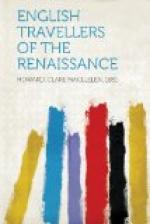Chesterfield considered it best to show no erudition at Paris before the rather illiterate society there. As the young men were all bred for and put into the army at the age of twelve or thirteen, only the women had any knowledge of letters. Stanhope would find at the academy a number of young fellows ignorant of books, and at that age hasty and petulant, so that the avoidance of quarrels must be a young Englishman’s great care. He will be as lively as these French boys, but a little wiser; he will not reproach them with their ignorance, nor allow their idlenesses to break in on the hours he has laid aside for study.
Such was the plan of a Grand Tour laid down by one of the first gentlemen of Europe. It remains one of the best expressions of the social influence of France upon England, and for that reason properly belongs to the seventeenth century more than to the Georgian era in which the letters were written. Chesterfield might be called the last of the courtiers. He believed in accomplishments and personal elegance as a means of advancing oneself in the world, long after the Court had ceased to care for such qualities, or to be of much account in the destinies of leading Englishmen. Republicanism was in the air. Chesterfield was thinking of the France of his youth; but France had changed. In 1765, Horace Walpole was depressed by the solemnity and austerity of French society. Their style of conversation was serious, pedantic, and seldom animated except by a dispute on some philosophic subject.[375] In fact, Chesterfield was admiring the France of Louis the Fourteenth long after “Le Soleil” had set, and the country was sombre. It was the eve of the day when France was to imitate the democratic ideals of England. England, at last, instead of being on the outskirts of civilization, was coming to be the most powerful, respected, and enlightened country in Europe. When that day dawned, Englishmen no longer sought the Continent in the spirit of the Elizabethans—the spirit which aimed at being “A citizen of the whole world.”
* * * * *
CHAPTER VII
THE DECADENCE OF THE GRAND TOUR.
During the several generations when the Stuarts communicated their love of France to the aristocracy of England, there was, as we might suppose, a steady undercurrent of protest against this Gallic influence. A returning traveller would be pursued by the rabble of London, who, sighting his French periwig and foreign gestures, would pelt his coach with gutter-dirt, squibs, roots and rams-horns, and run after it shouting “French Dogs! French Dogs! A Mounser! A Mounser!"[376] Between the courtiers and the true-born Englishman there was no great sympathy in the matter of foreign culture. The courtiers too often took towards deep-seated English customs the irreverent attitude of their master, Charles II.—known to remark that it was the roast beef and reading of the holy




